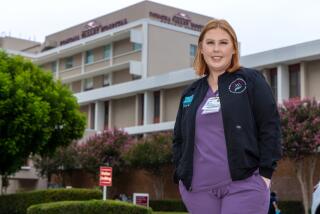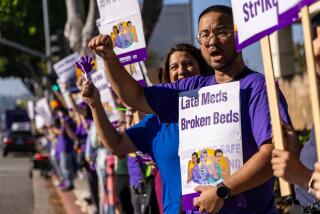State’s Hospitals Suffer Critical Nurse Shortage
- Share via
Experienced registered nurses, often considered expendable during this decade of managed care, now are stretched so thin that many California hospitals are scrambling to hire more, and some RNs already on the wards fear patient care is being compromised.
In Southern California, an ongoing shortage among specialty RNs has become critical in recent weeks as a mighty flu epidemic has flooded emergency rooms and intensive care units with patients, hospital employees say.
“I think . . . it’s dangerous,” said one registered nurse at Cedars-Sinai Medical Center, who spoke on condition of anonymity. “The number of nurses for patients at times is unsafe.”
Linda Burnes-Bolton, chief nursing officer at Cedars-Sinai, said nurses have been working extra shifts, but she denied that staffing ever has been insufficient or unsafe. And James Lott, senior vice president of the Healthcare Assn. of Southern California, said he has seen no evidence that legal staffing requirements have been violated.
Yet he acknowledged that the flu epidemic has underscored the region’s poor preparation for widespread medical crises and illustrated the need to train and recruit more RNs in specialty fields.
“We could not handle an earthquake today,” he said. “We’d have to revert to a MASH-like situation.”
In Northern California, there is an overall nursing shortage that is most pronounced in specialty areas, said Doloras Jones, divisional director of nursing for Kaiser Permanente, the state’s largest HMO. Jones said Kaiser is in the process of filling 600 vacant RN positions there.
“This is just the tip of the iceberg,” Jones said of the shortage. She said that in California and other parts of the country, the problem now is one of maldistribution--an unmet need for nurses with specific skills such as those required in the operating room, the emergency room and the ICUs.
Soon to follow, she believes, will be a crisis of supply: not enough registered nurses of any stripe.
Explanations for the shortage are complex and varied. Health care industry experts cite aging and retirements among the registered nurse work force (average age: 44); cutbacks on inpatient beds and staffing as a result of managed care; an unexpectedly large influx of sicker patients; closure or scaling down of nursing schools and hospital training programs; and expansion of opportunities for young women in the work force outside hospitals and the helping professions.
For evidence of the health care sector’s concern, one need look no further than the proliferating classified ads in newspapers and trade magazines. Hospitals are offering signing bonuses, housing allowances, special training--even free or discounted meals on site.
“Hospitals are almost in a bidding war” for specialty nurses, Lott said.
In addition, some hospitals have launched internal programs to prepare their staffs for multiple assignments. Cedars has a “cross-training” program for various specialties within nursing, said Burnes-Bolton.
Some critics say hospitals are paying the price for ill-considered, overzealous cost-cutting in the early 1990s, as managed care took hold.
“Health care corporations didn’t like the idea they had to pay a primarily female work force so much money,” said Rose Ann DeMoro, executive director of the California Nurses Assn.
“They . . . pushed nurses out the door, devalued the profession. They [corporations] are the victims of their own designs.”
Jones disagreed, saying that the cutbacks and downsizing in hospitals came in response to declining inpatient counts. Now, the increased demand requires some “rebuilding,” she said.
The California Nurses Assn. deemed the situation so critical in Northern California that the group called upon Gov. Pete Wilson last week to declare an “emergency care crisis” prohibiting acute care and emergency room closures and any further downsizing.
A spokeswoman said the governor’s office is closely monitoring the situation.
Some nurses in Southern California say the situation on their units has become uncomfortable, and sometimes unsafe, for patients.
Nurses at various Los Angeles hospitals--who requested anonymity--said they or their colleagues have been assigned more patients than they can handle, or even more than the law allows. For example, in intensive care units, they say, nurses legally limited to caring for two patients have been assigned a third, causing the RNs to fear for their licenses.
On other units, “a lot of times, the patient sits in the room and isn’t seen,” said one nurse at St. Vincent Medical Center, who stressed that the hospital is not unique.
“People are not monitored as well. . . . Somebody could be lying in bed unconscious and nobody sees that because they’re doing something else.”
One dilemma, that nurse said, is that hospitals have gradually replaced registered nurses with cheaper “patient support technicians” who are not qualified to perform the range of duties nurses can. They cannot, the nurse said, assess patients’ condition and may not notice a deterioration.
Some patients and their families have noticed that it is hard to get nurses’ attention for anything that is not an emergency.
Carol Dresben, a Studio City resident whose elderly aunt had surgery for colon cancer at Cedars-Sinai four weeks ago, said she sat in her aunt’s room for four hours at one point and no nurse looked in on the patient, not even during lunch when she required assistance eating. She said that even when her aunt buzzed for help using the bathroom, she was made to wait a half-hour.
“There were days when she had really good nursing care, but there were times they would say, ‘I’ll get there in a minute’ and never come,” she said.
Dresben said her aunt did what nurses say many more well-off patients now do to ensure that they get good care. On her last day, she brought in a bedside “sitter”--an aide who can minister to basic patient needs and make a ruckus when those needs are crucial.
Cedars officials say the quality of care at the hospital has not suffered. “I’ve heard from the staff that they feel like they’re tired because of having to work extra shifts,” nursing chief Burnes-Bolton said. “I haven’t heard of any unsafe conditions. One of my jobs is to make sure there is sufficient nursing. . . . There has been at all times.”
Several nurses said they and their colleagues are determined to preserve quality, whatever the conditions.
“We are here to provide good quality care,” said Lisa Speer, a critical care nurse who was running ragged this week between her job at UCLA Medical Center and urgent calls from various registries or nursing “temp” agencies. “That’s why we nurse. . . . I think a lot of nurses are angry, but their standards didn’t change.”
More to Read
Sign up for Essential California
The most important California stories and recommendations in your inbox every morning.
You may occasionally receive promotional content from the Los Angeles Times.













